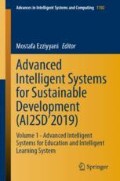Abstract
E-learning systems are the result of the new era of digitalization, which has affected many areas including education. These systems offer many benefits like ease of access and time management. Therefore, the educational paradigm has been changed. Otherwise, since E-learning systems consider only the cognitive state of the learner regardless of his emotional state, they cannot instruct students effectively. Moreover, if the target learner has non-ordinary cognitive and socio-emotional abilities, such as a child with ASD (Autism Spectrum Disorder). So, the e-learning system must be able to satisfy those needs and propose a suitable content according to his learning rhythm.
This paper proposes a new multi-agent architecture of an emotional intelligent e-learning system, it aims to help ASD children overcome learning impairments. The proposed architecture is based on several agents, endowing to address emotional, cognitive and pedagogical issues intelligently. They are working in a collaborative and cooperative fashion to provide the appropriate content.
Access this chapter
Tax calculation will be finalised at checkout
Purchases are for personal use only
References
Naidu, S.: E-Learning: A Guidebook of Principles, Procedures and Practices, 2nd edn, 88. P. Commonwealth Educational Media Center for Asia (CEMCA), New Delhi, India (2006)
Paul, H.: Elearning Technology, Content and Services, Education + Training 43(4), 249–255 (2001)
Jenkins, M., Hanson, J.: E-learning Series: A Guide for Senior Managers, Learning and Teaching Support Network (LSTN). Generic Centre, United Kingdom (2003)
de Arriaga, F.:. E-Knowledge Management, ELearning and E-Commerce: An Evaluation of Their Situation and Tendencies. International Computer Science Institute, Technical Report, University of California, Berkeley, pp. 1–56 (2003)
de Arriaga, F., El Alami, M., Arriaga, A.:. ELearning: new generation of intelligent web based systems. In: Proceedings 14th International Conference on Computer Theory and Applications, pp. 191–198. Alexandria (2004)
Phobun, P., Jiracha, V.: Adaptive intelligent tutoring systems for e-learning systems. Procedia Soc. Behav. Sci. 2, 4064–4069 (2010)
Damasio, A.: Descartes Error: Emotion. Reason and the Human Brain, Vintage Digital, London (2008)
Picard, R.W.: Affective Computing. The MIT Press, Cambridge, MA, US (1997)
Gano-Phillips, S.: Affective learning in general education. Spec. Top. Assess. Univ. General Educ. Program 6(1), 1–44 (2009)
Krathwohl, D.R., Bloom, B.S., Masia, Bertram B.: Taxonomy of Educational Objectives: The Classification of Educational Goals. Handbook II: Affective Domain. McKay, New York (1964)
Duo, S., Xue, L.S: An e-learning system based on affective computing. Phys. Procedia 24 (2010). https://doi.org/10.1109/icime.2010.5477869
Bokhari, M.U., Sadaf, A.: BOKHARI-Intelligent Multi-agent based e-Learning System (IMBLS) for Interactive Distance Learning (2014)
Daomin, X.: Multi-agent based e-learning intelligent tutoring system for supporting adaptive learning. In: Proceedings—2013 4th International Conference on Intelligent Systems Design and Engineering Applications, ISDEA 2013, pp. 393–397 (2013). https://doi.org/10.1109/isdea.2013.494
Sehaba, K., Estraillier, P.: A Multi-Agent System for Rehabilitation of Children with Autism (2005)
Barakova, E., Gillessen, J., Feijs, L.: Social training of autistic children with interactive intelligent agents. J. Integr. Neurosci. 8, 23–34 (2009). https://doi.org/10.1142/s0219635209002046, https://elearning.autism.net/
de Arriaga, F., El Alami, M.: NEOCAMPUS2: A multi-agent environment for educational research and applications. In: Innovation, Technology and Research in Education. Iadat (2004)
de Arriaga, F., El Alami, M., Arriaga J., Arriaga, F.: NEOCAMPUS: multi-agent software environment for on-line learning. In: Proceedings of International Conference on Information Technology and Education, ICT’2002, pp 1245–1255. Badajoz (2002)
de Arriaga, F., El Alami, M.: MEDIC2: Evaluation of a Fuzzy Intelligent Learning System (2006)
de Arriaga, F., El Alami, M., Arriaga, A.: Evaluation of Fuzzy Intelligent Learning Systems Recent Research Developments in Learning Technologies (2005)
El Alami, M., Tahiri, N., de Arriaga, F.: DIAUTIS: a fuzzy and affective multi-agent platform for the diagnosis of autism. Br. J. Appl. Sci. Technol. 21, 1–28 (2017). https://doi.org/10.9734/BJAST/2017/33716
Bratman, M.E.: Intentions, Plans, and Practical Reason. Harvard University Press, Cambridge, MA (1987)
Wooldridge, M.: An Introduction to Multiagent Systems, 2nd edn. John Wiley & Sons Inc, New York (2009)
Tahiri, N., El Alami, M.: KASP: A cognitive-affective methodology for designing serious learning games. Int. J. Adv. Comput. Sci. Appl. 9 (2018). https://doi.org/10.14569/ijacsa.2018.0911103
Brugha, T. et al.: The NHS Information Centre: Community and Mental Health Team: Estimating the prevalence of autism spectrum conditions in adults: extending the 2007 Adult Psychiatric Morbidity Survey. Leeds: NHS Information Centre for Health and Social Care (2012)
Author information
Authors and Affiliations
Corresponding author
Editor information
Editors and Affiliations
Rights and permissions
Copyright information
© 2020 Springer Nature Switzerland AG
About this paper
Cite this paper
Tahiri, N., El Alami, M. (2020). An Intelligent E-Learning System for Autistic Children: Multi-Agent Architecture. In: Ezziyyani, M. (eds) Advanced Intelligent Systems for Sustainable Development (AI2SD’2019). AI2SD 2019. Advances in Intelligent Systems and Computing, vol 1102. Springer, Cham. https://doi.org/10.1007/978-3-030-36653-7_8
Download citation
DOI: https://doi.org/10.1007/978-3-030-36653-7_8
Published:
Publisher Name: Springer, Cham
Print ISBN: 978-3-030-36652-0
Online ISBN: 978-3-030-36653-7
eBook Packages: Intelligent Technologies and RoboticsIntelligent Technologies and Robotics (R0)

